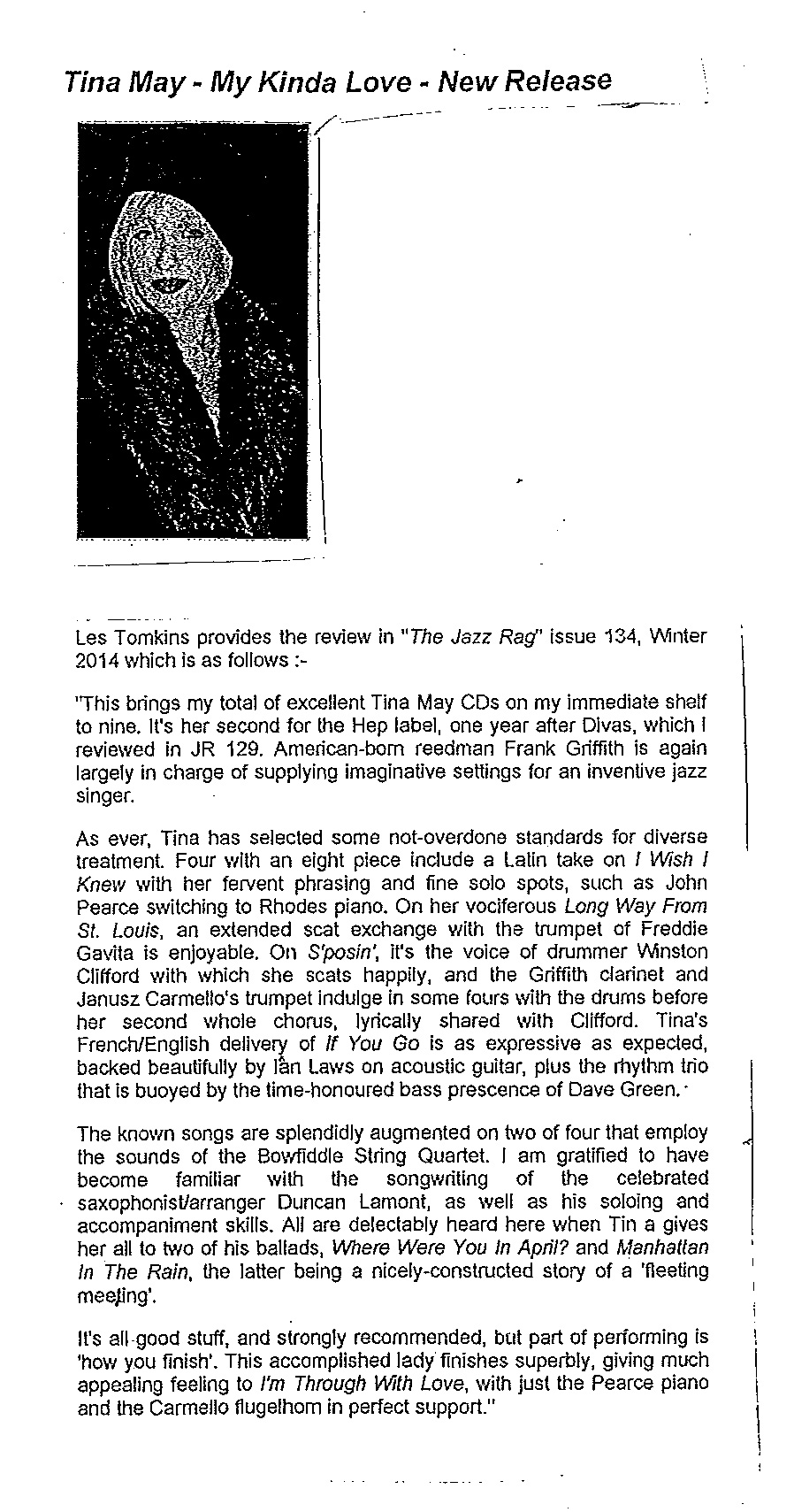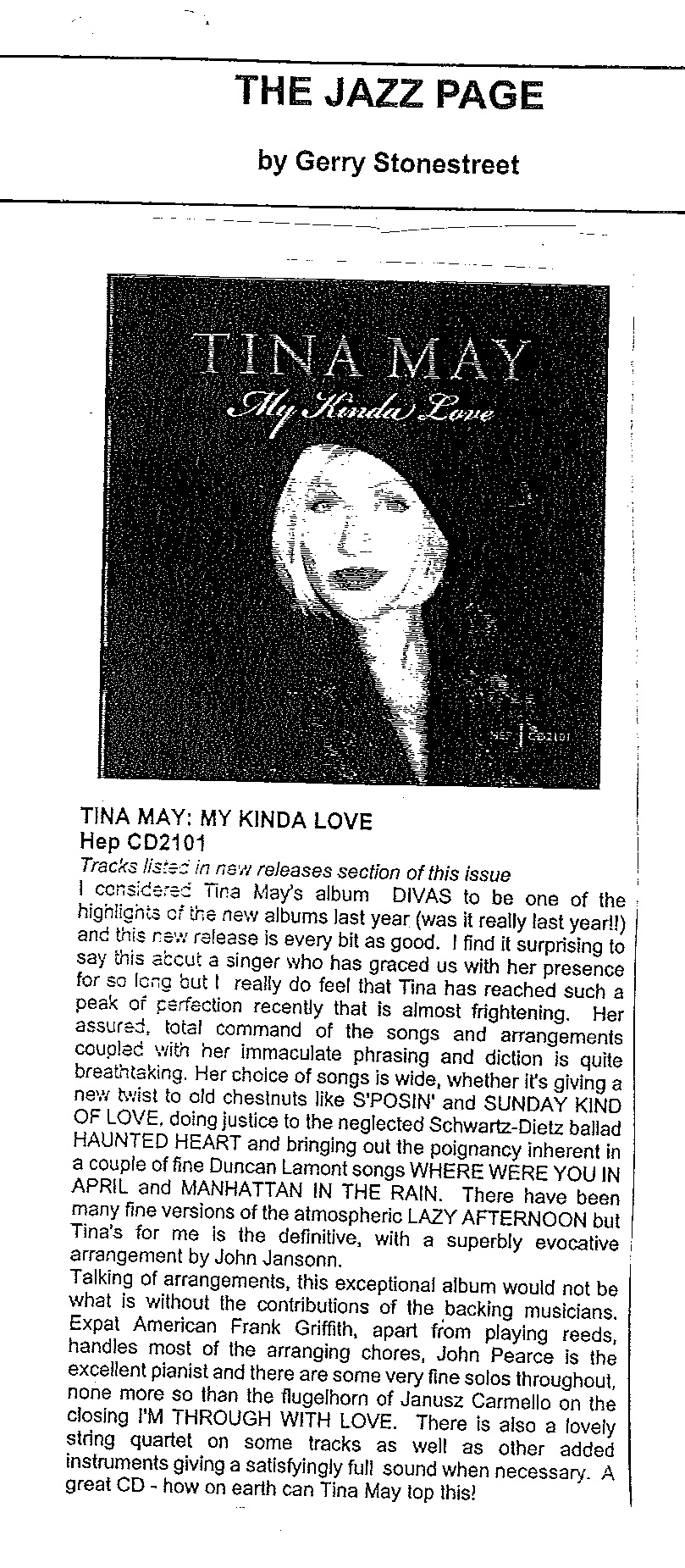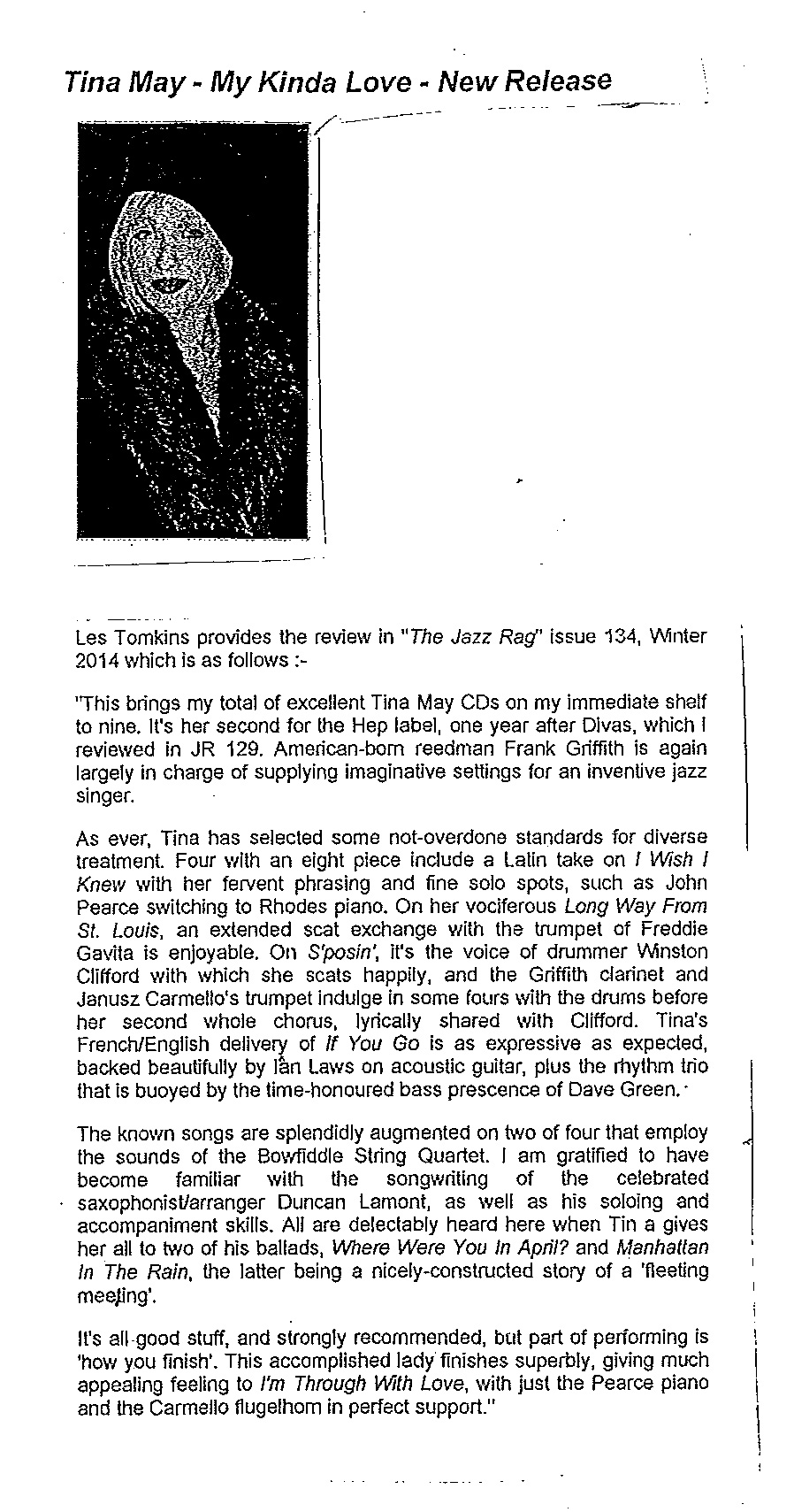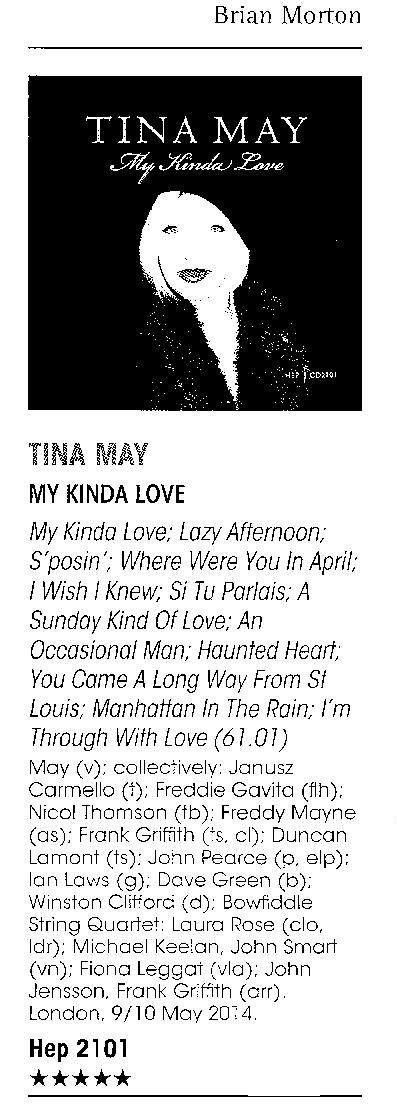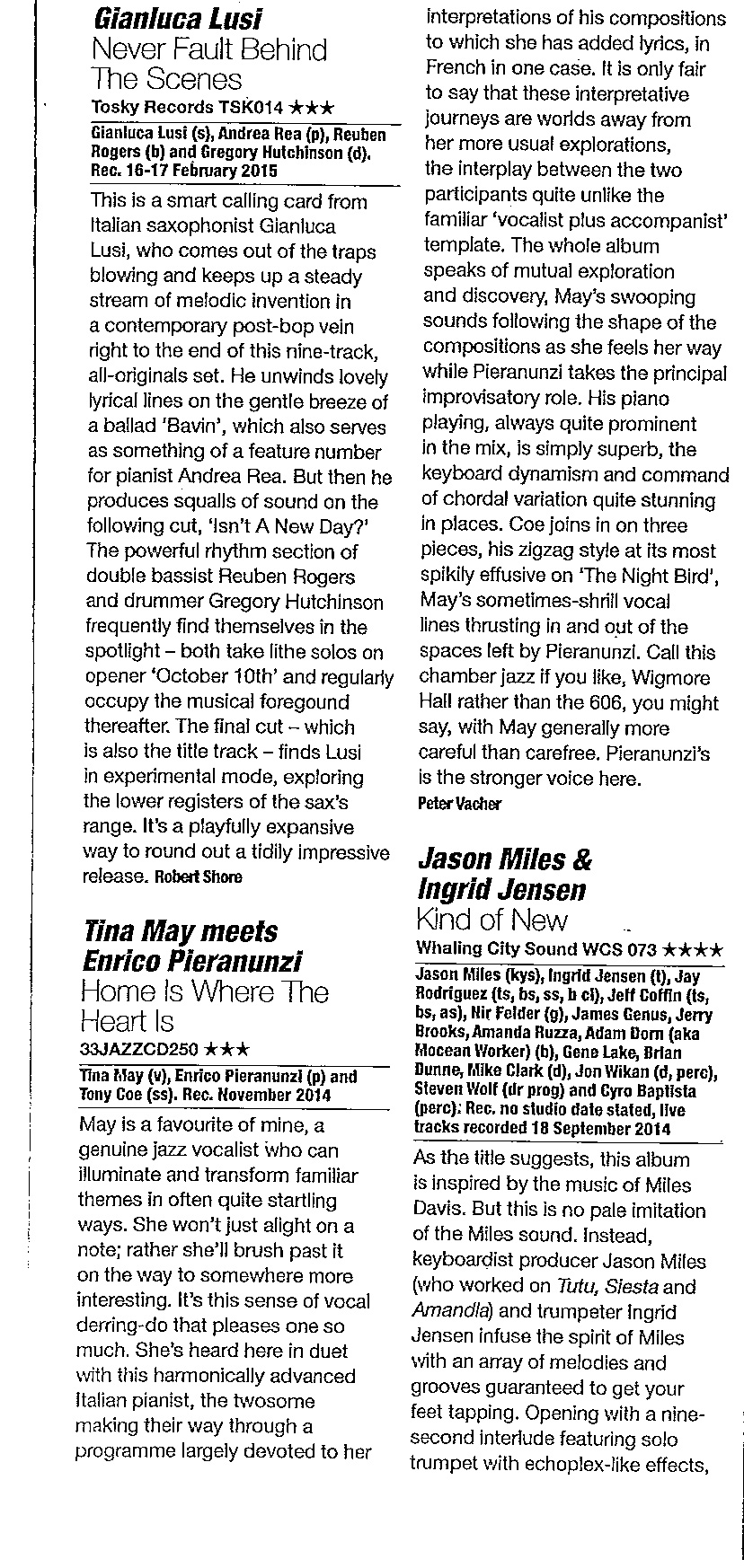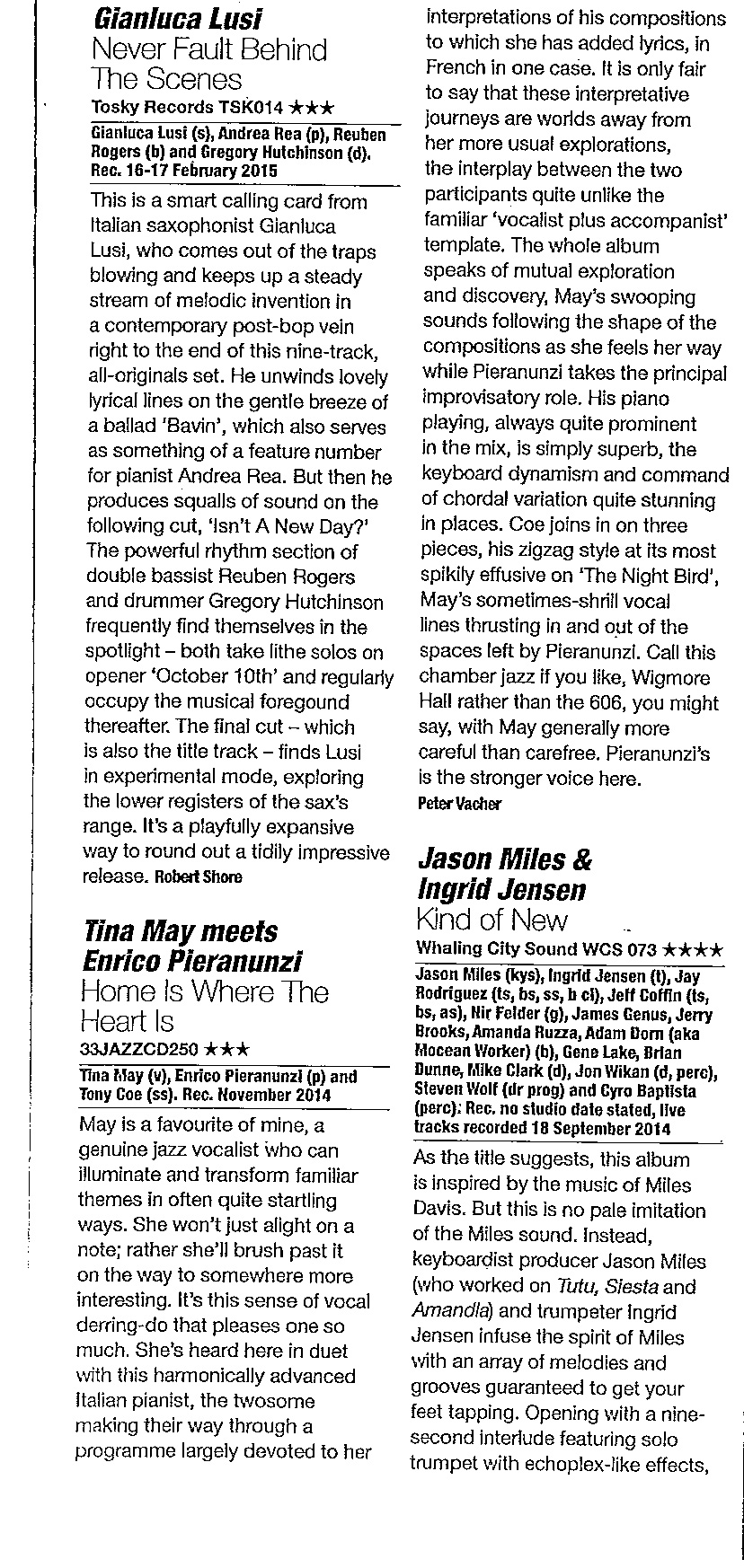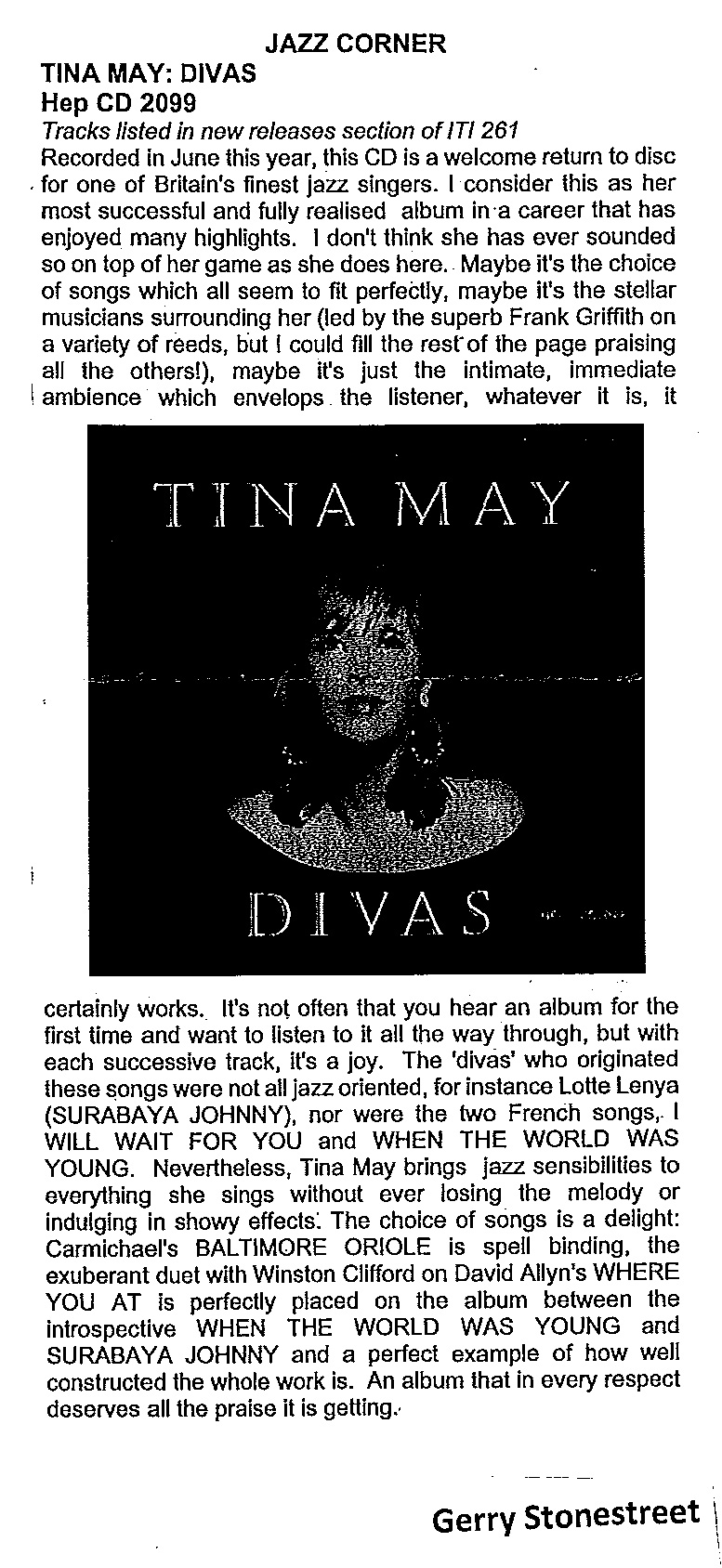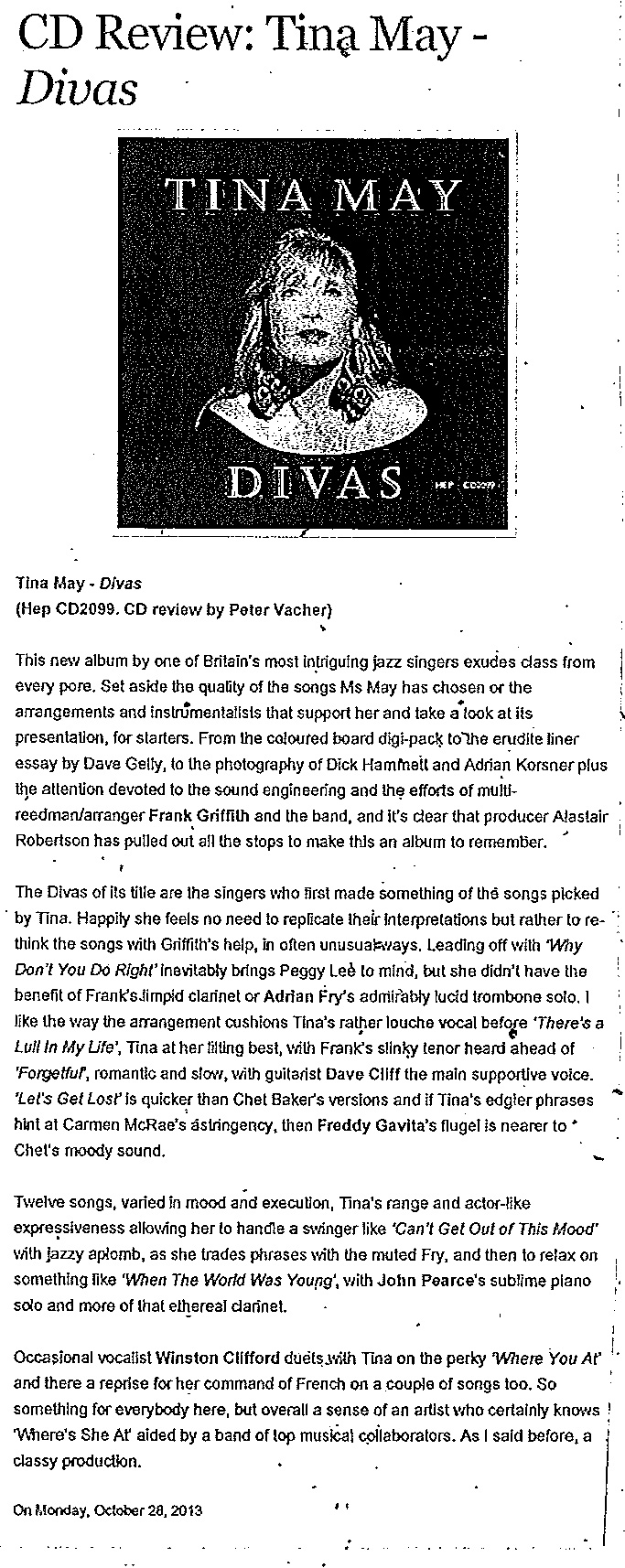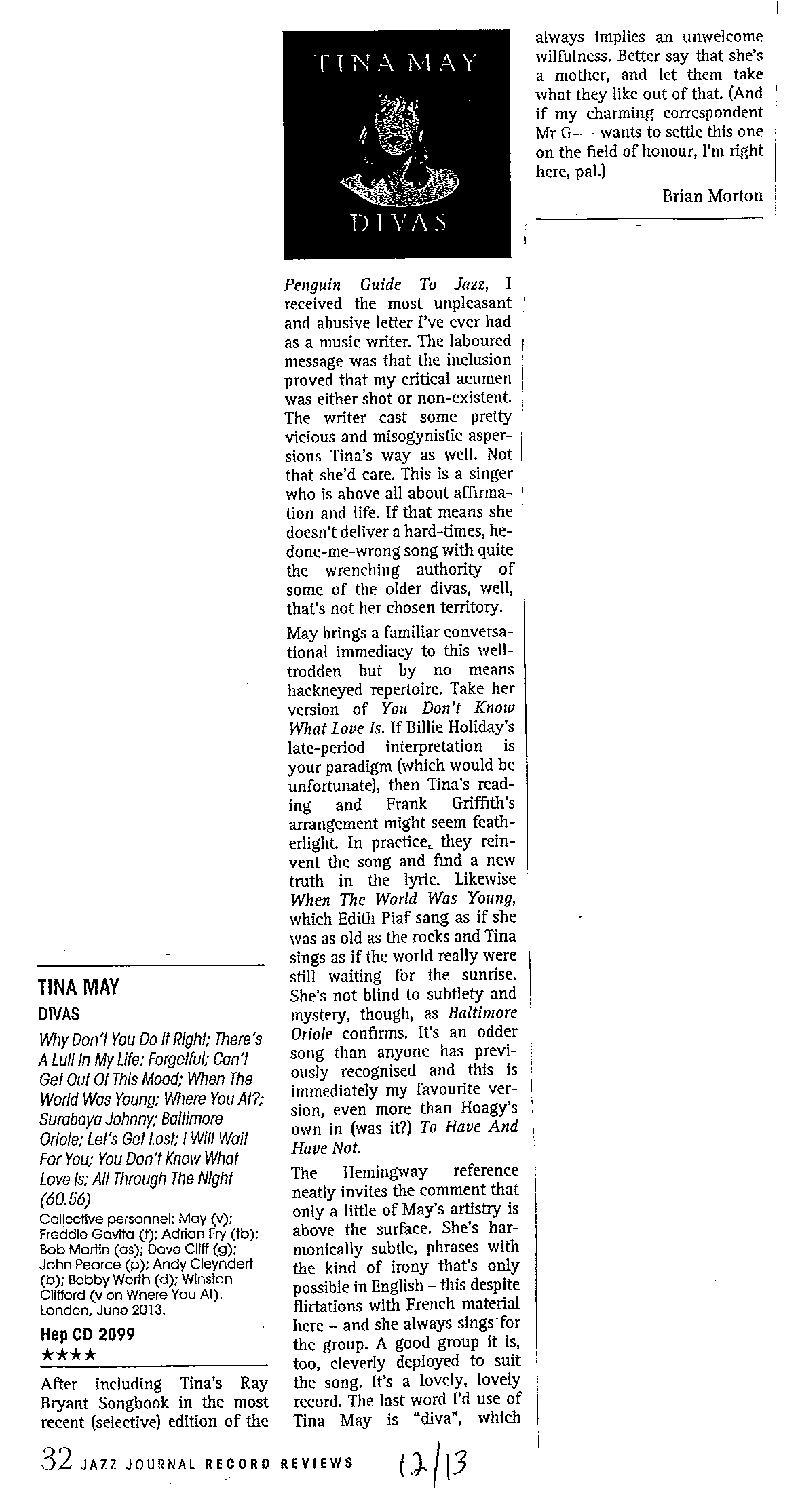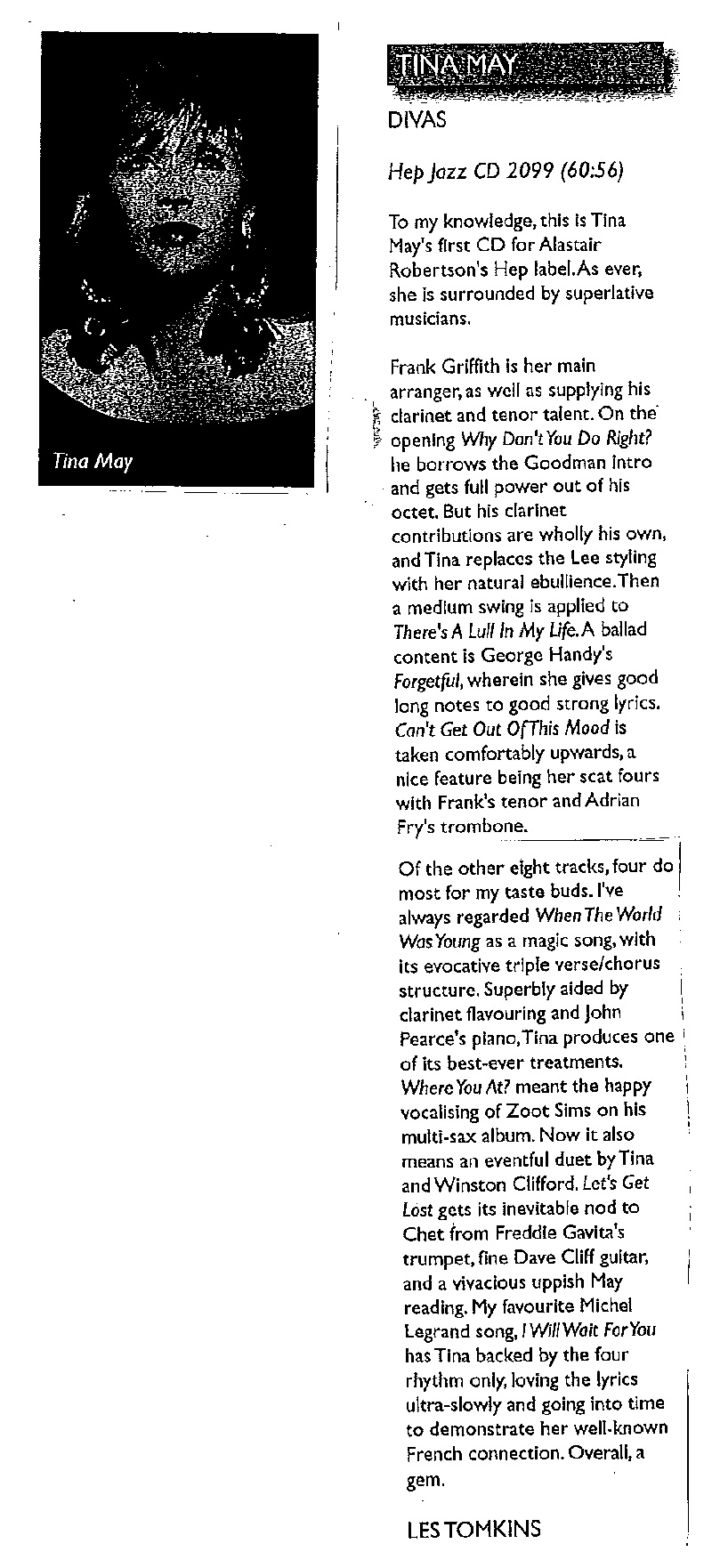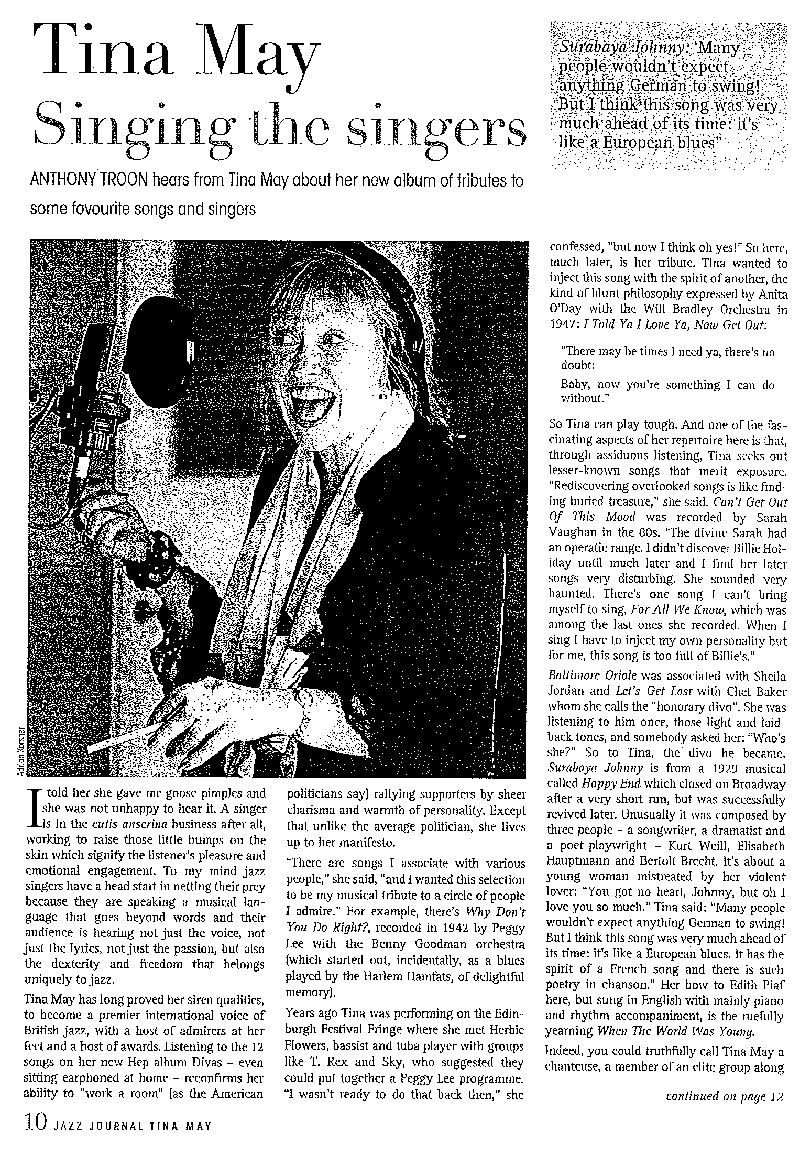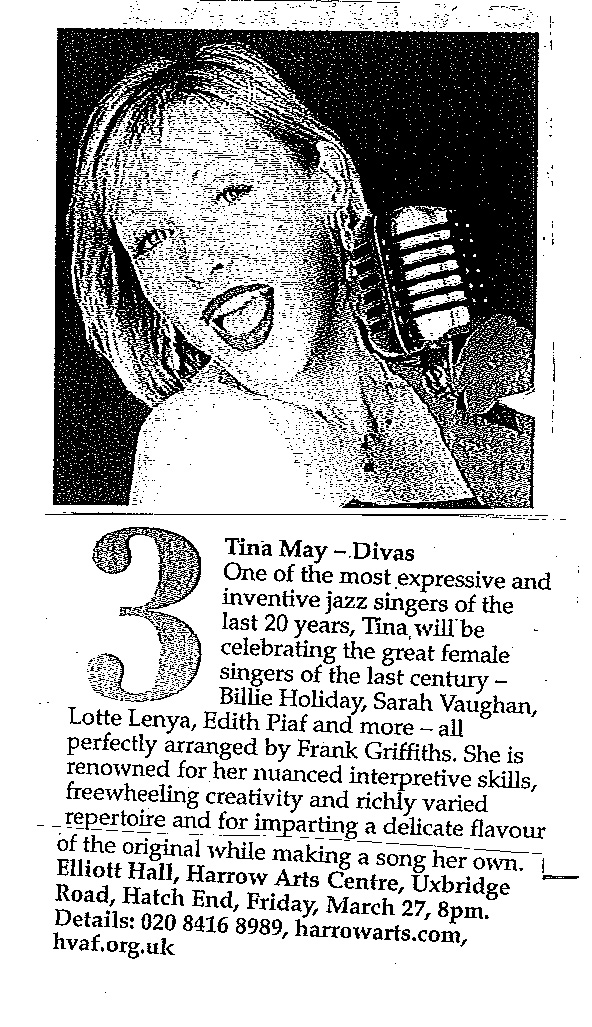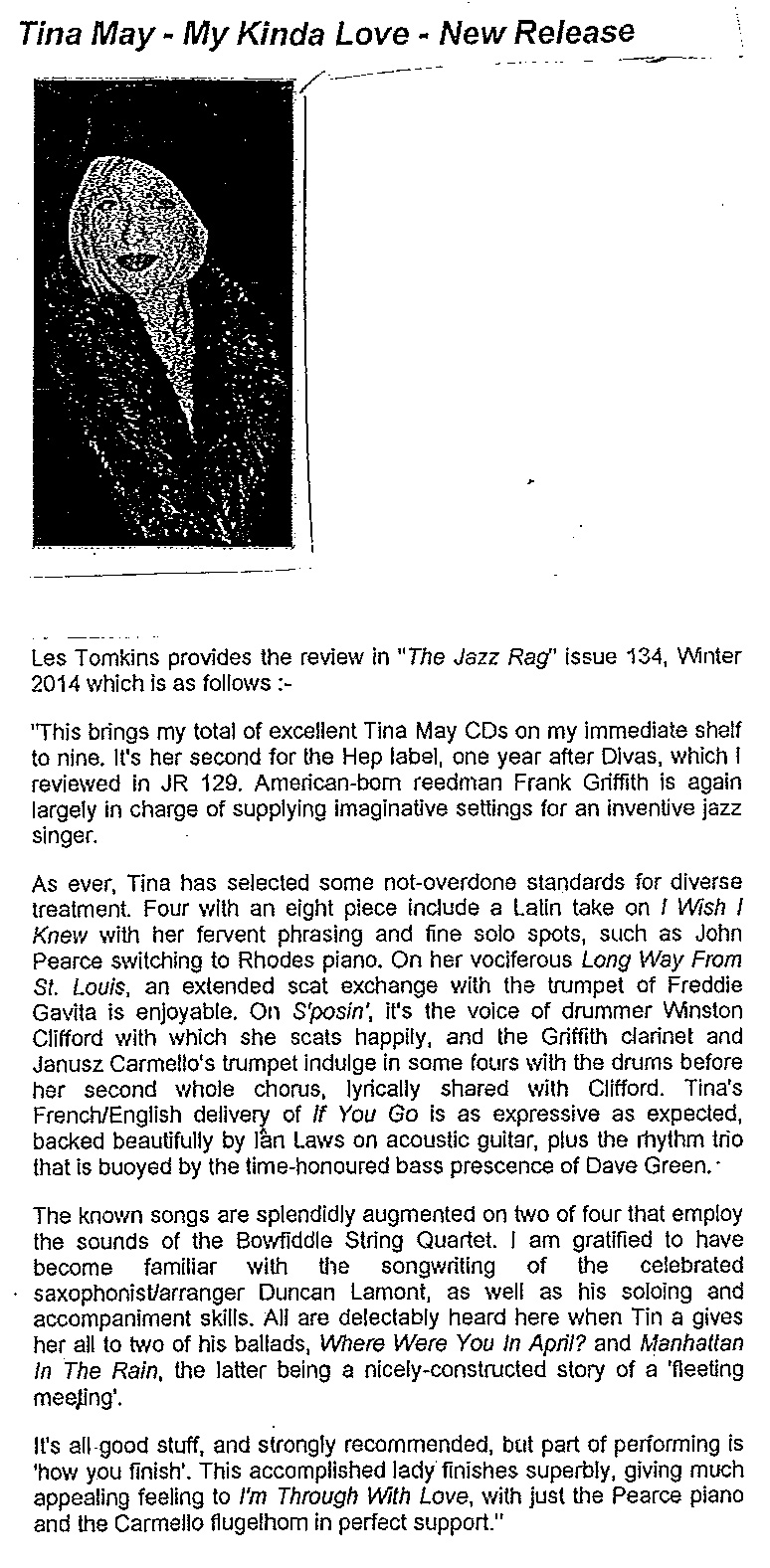Reviews
Below are all of the live reviews that include me over the years. Click the plus button to read more.
Sat in the section, Wynton was both ring-master and arranger for the opening ‘Appointment in Ghana’, a Jackie McLean piece, his extended solo like a compendium of possibilities, embracing tough riffs and sudden darts contrasted with extended figures, the band’s classy rhythm section locked into swing. ‘Fee Fi Fo Fum’ by Shorter proved to be a harder nut to crack, Ted Nash’s chart colour-blocked and heavy, although sparked initially by pianist Dan Nimmer’s neat Monk-inclined patterns. The band’s sole British member, Norwich-born trombonist Elliott Mason showed off his more solemn side on Shaw’s ‘The Moontrane’, before ramping up his solo as the bravura trumpet flourishes powered in, lead-man Kenny Rampton’s high-note alacrity as good as could be. Silver’s ballad, ‘Peace’ then introduced Facey, complimented straightaway by Wynton both for his sartorial and creative qualities – “he plays as well as he dresses” – and indeed he did, unpacking ideas in a seamless flow, the applause from both bandstand and audience leading into Wright’s arrival, his four-malleted outpourings on ‘Senor Blues’ momentarily making even the seasoned JLCO players blink in awe. And he looked sharp, too.
More good things followed, four more pieces arranged by four more band members, with trombonist Chris Crenshaw’s version of McCoy Tyner’s ballad ‘Search for Peace’ an elegantly shaded and eloquent reading featuring baritone saxophonist Paul Nedzela (standing in for the absent Joe Temperley), his perfect sound and tonal command impressing everyone, the audience held rapt. Facey and Wright returned for Joe Henderson’s ‘Inner Urge’, up on their toes and unphased by drummer Ali Jackson’s carpet-bombing, Mason joining them to make a powerful, all-Brit front-line. More ovations proffered. If ‘Free For All’ was the expected, storming closer with tenorist Walter Blanding at his congenial best and Crenshaw playing good, hard-swinging trombone, we knew somehow that there might be more to come, even as the bandstand cleared .
In New Orleans, there’s a custom called ‘lagniappe’, that little bit extra on the side of the plate and Wynton gave us it in musical form, staying on with the rhythm section to play as nifty a solo sequence on an up-tempo blues as you could want, moderating to a ballad feel when Blanding sidled on. Cue standing ovation and cheers, and why not? A grand night for swinging, for sure.
©Peter Vacher / 3 July 2014
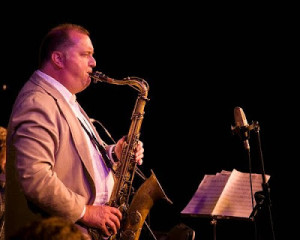 Frank Griffith, whom I’ve mostly heard in a big band context, also has a tight and joyful quintet with Frank on tenor and clarinet, Mick Hutton on bass, Bobby Worth on drums, Robin Aspland on piano and Henry Lowther on trumpet. Featuring special guest vocalist Tina May, they put up a valiant fight against the World Cup football to claim the attention of the people at the Bull’s Head in Barnes on a summer night.
Frank Griffith, whom I’ve mostly heard in a big band context, also has a tight and joyful quintet with Frank on tenor and clarinet, Mick Hutton on bass, Bobby Worth on drums, Robin Aspland on piano and Henry Lowther on trumpet. Featuring special guest vocalist Tina May, they put up a valiant fight against the World Cup football to claim the attention of the people at the Bull’s Head in Barnes on a summer night.
On Andy Razaf’s Christopher Columbus Frank’s playing is soulful and assertive with feathery phrasing and great breath control, a bebop butterfly beginning to unfurl in its swing chrysalis. Henry Lowther offers his own commentary on the theme in long lucid phrases and Mick Hutton chases the tune down a well with his nimble, reverberant bass, then re-energising the combo with some slaps and scat. Bobby Worth plays taut, rock solid drums with cascading cymbal cadences.
Fuji Mama by Blue Mitchell changes the mood in a heartbeat to clipped calypso. Bobby Worth really blossoms on the drum kit, playing in counterpoint to himself as Henry Lowther offers sharp Caribbean sketches, effortlessly exploring a new sound world. Jamaican jauntiness pervades Robin Aspland’s raucously good-humoured piano — his spiky intricacies are infectious and toe-tapping. Frank Griffith’s plump and flavourful tenor pushes big slabs of music over the choppy rhythms of the drums. The unison sax and trumpet is a delight.
Dexter Gordon’s Soy Califa, played in honour of a recent review here begins with fanning flashes of sound and tight ensemble work before Frank emerges from the pack with a dark virile tenor solo, pumping and punching out rhythmic utterances, attenuating into a melancholy ballad statement. Henry Lowther is thoughtful and pungently wistful. Robin Aspland plays raw, caressing, fluid runs — a statement in cool excitement.
Song for My Father was dedicated to its recently deceased composer, Horace Silver. Aspland paraphrases the famous opening statement, immortalised by Steely Dan in their quotation on Rikki Don’t Lose That Number, and Frank plays a trance-like intro. The whole band glides through the tune like a speedboat skimming on the water, before Henry Lowther lifts off like a seabird taking flight. Frank Griffith rises in reply with a rich, rolling solo that never seems to run out of steam. Bobby Worth is percussive and powerful, Robin Aspland rebuilds the melody and Mick Hutton provides the thumping, slapping, beating heart of the piece. Horace Silver is dead, but his music is undeniably alive.
Let’s Get Lost introduces singer Tina May at a strolling, striding tempo. Her vocals go floating into the stratosphere, creating an ethereal dreamscape, soft as cumulonimbus. Henry Lowther’s trumpet breaks through the clouds like a shaft of sunlight. Mick Hutton’s bass sustains the dreamy mood by making his strings sing. Robin Aspland creates lots of space in the music and Bobby Worth is a soft touch on the brushes. Tina May scats in duet with Henry Lowther before she lovingly explores the spacey contours of the lyrics.
Tea for Two rolls in as a rich sea mist of vocals with gleaming glimpses of piano. Then the tempo accelerates with Bobby Worth coming in on brushes and Frank Griffith insinuating himself on clarinet with sonorous, playful clarity, scooting and skating through the melody — throwing in a quotation from Baubles, Bangles and Beads without missing a beat. Tina May and Frank duet so seamlessly that it becomes clear that tea isn’t the only thing ideally suited for two.
On Lazy Afternoon Robin Aspland conjures a sound picture underpinned by Mick Hutton’s bass, Worth’s rolling, splaying brushes and completed by Tina May savouring and flavouring the lyrics with her own distinctive, tasteful emphasis. Her lazy phrasing draws out the meaning of the song’s pastoral pastels. Mick Hutton plays a dancing, tuneful solo that buzzes around the room, vibrant and precise. Along with Bobby Worth, Hutton provides a dreamy, misty edge, like a summer haze blurring to infinity, and Robin Aspland plays a chiming coda to Tina May’s lingering vocals.
English football may have been losing on the television screens next door, but here in the back room at the Bull’s Head, British jazz was heading for a decisive victory.
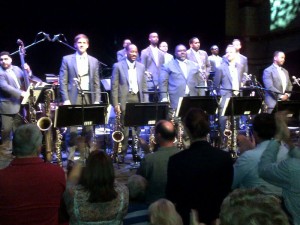 The Jazz at Lincoln Center Orchestra’s programme for its current UK tour – dates below – presents as its unifying theme arrangements of tunes from Blue Note albums, using the pretext of the Blue Note 75th to re-visit and re-imagine a part of the label’s heritage, in a similar way to that which classical music uses anniversaries to drive programming.
The Jazz at Lincoln Center Orchestra’s programme for its current UK tour – dates below – presents as its unifying theme arrangements of tunes from Blue Note albums, using the pretext of the Blue Note 75th to re-visit and re-imagine a part of the label’s heritage, in a similar way to that which classical music uses anniversaries to drive programming.
Most of the arrangements are by eight current band members, of the fifteen who are touring. The tour repertoire is selected from a total of thirty tunes. New arrangements are also being added all the time – tonight there was a wholly new arrangement of Dexter Gordon’s ballad Ernie’s Tune by Sherman Irby, a feature for JLCO’s pair of wonderfully full-toned and well contrasted tenor saxophonists Victor Goines and Walter Blanding.
There are also charts from the early days of JLCO (1988-1994) when David Berger was writing for and conducting the band. Berger’s arrangement of Peace from Blowin’ The Blues Away was played as a poignant tribute to Horace Silver. It has gorgeously lush textures. Trumpeter Ryan Kisor stated each iteration of the opening of the theme with phrasing to die for; this performance was a definite high-point of the evening. Marsalis told of a fond memory of working with Horace Silver. Silver had come in as an examiner in the nationwide Essentially Ellington high school band competition. The much-missed pianist and composer maintains the distinction of having been the harshest marker. Ever.
I also enjoyed Ted Nash’s re-imagining of Wayne Shorter’s Fee-Fi-Fo-Fum, gloriously revelling in the sound of the full band, giving the masterful drummer Ali Jackson plenty of opportunity to challenge and spur on the soloists, and leaving room for subtle and sinuous trombone counter-melodies. Great piece.
Carlos Henriquez’ arrangement of Horace Silver’s Senor Blues was this evening’s closer – it had opened the tour in Harrogate. It gave pianist Dan Nimmer a chance to shine. It also showed the superb way in which Ali Jackson manoeuvres the band seamlessly from one tempo to another. At one point Marsalis talked about the “Jazz at Lincoln Center Orchestra, conducted by Ali Jackson.” It is a very smart remark with a sort of Nietzschen rather than a literal truth about it.
Others will disagree, but I did feel that there was unevenness in the quality of the arrangements. It brought me back to thoughts of the best big band album I have heard this year, the SNJO album American Adventure reviewed here . The arrangements on that album, by the likes of Fred Sturm and Geoffrey Keezer simply have more substance and more oomph than some of what I was hearing tonight.
That said, a virtually full 1,100-capacity Corn Exchange on the day Cambridge is also in thrall to its Midsummer Fair is very impressive – the whole downstairs section gave a standing ovation…That and Marcus Printup’s unbelievably powerful, and powerfully constructed solo on Free For All – these are the memories to keep from a very fine gig.
First Set
Appointment in Ghana – Jackie McLean Arr. WyntonMarsalis
Fee Fi Fo Fum – Wayne Shorter Arr. Ted Nash
The Moontrane – Woody Shaw Arr. Victor Goines
Peace – Horace Silver Arr. David Berger
Free For All – Wayne Shorter Arr. WyntonMarsalis
Second Set
The Thespian – Freddie Redd Arr. Vincent Gardner
Search for Peace – McCoy Tyner Arr. ChrisCrenshaw
Riot – Herbie Hancock Arr. Sherman Irby
Ernie’s Tune – Dexter Gordon Arr. Sherman Irby
Senor Blues – Horace Silver Arr. Carlos Henriquez
JAZZ AT LINCOLN CENTER ORCHESTRA
Wynton Marsalis, Kenny Rampton, Marcus Printup, Ryan Kisor – Trumpets
Chris Crenshaw, Vincent Gardner, Elliot Mason – Trombones
Victor Goines, Ted Nash, Walter Blanding, Sherman Irby, Paul Nedzela – Saxophones
Carlos Henriquez – Bass
Ali Jackson – Drums
Dan Nimmer – piano
 String Quartet Festival: Gwilym Simcock Trio with the Brodowski Quartet
String Quartet Festival: Gwilym Simcock Trio with the Brodowski Quartet(Pizza Express Jazz Club, Dean Street, 5 April 2014. Review by Andy Boeckstaens)
Jazz and classical music can be uneasy, even unruly bedfellows. When composer/pianist Gwilym Simcock asserted recently, in reference to his new recording with the City of London Sinfonia (Instrumation, ACT 9564-2) that he feels most comfortable with music “in that space between classical and jazz” it led to the expectation of something that was coming from a particular space, not to be assessed as a hybrid with the different frames of reference one may want to apply separately to jazz or classical music, but very much on its own terms.
From the outset of this appearance of Simcock’s trio alongside the Brodowski Quartet – on the penultimate night of the String Quartet Festival curated by Frank Griffith, Simcock swayed back and forth as he played, and occasionally made sweeping gestures to conduct Dunja Lavrova and Catrin Morgan (violins), Amy Stanford (viola) and Ashok Klouda (‘cello).
The rich tone and dexterity of bassist Yuri Goloubev were prominent throughout the evening, and he delivered a profound solo on Message after a lovely, gentle beginning from the string quartet. Martin France – shorn of his flowing locks – was also impressive, and frequently used his hands on the drums when a softer sound than sticks or brushes was required. Passionate as ever, Simcock grinned with pleasure and grimaced with exertion as he raised himself off his stool during the more ecstatic passages, sometimes reaching in to pluck or strum the strings.
Antics was commissioned for the 2012 City of London Festival, to be performed (serially) on 50 golden upright pianos around the City. Simcock eloquently explained that it was originally designed “for crap pianos”, and hoped that its energetic Latin-inflected rhythm would disrupt the annoying chatter from a small group of people near the front. It did; and also swamped the strings. A highlight was Tawel Nawr (Quiet Now) . During the opening pieces, the quartet worked as a homogenous unit and featured no-one individually; here, we had short solos for violin and ‘cello. Ironically, this was the only time that the quartet and trio really gelled, in a way that reminded me of the beautiful things that Ron Carter recorded around 1980.
Barber Blues – a rhythmic, 16-bar tune with a left-hand ostinato and contrapuntal lines, dedicated to Samuel Barber – ended the 55-minute set by the trio and string quartet with a stylish flourish.
Did it work? Not for me. The sound was attractive, and of course it was well played. The snag was nothing to do with any jazz/classical divide. It was caused by the frustration – save for a few inspired moments – that the trio and the quartet have not properly gelled yet, and that they did not really interact. For this kind of thing to succeed, the writing has to allow for complete integration, and the participants need time to rehearse, understand each other, and become truly immersed in the music. Perhaps a process like that needs more time.
I found the second set, by the Simcock/Goloubev/France trio, more satisfying. During Kenny Wheeler’s Everybody’s Song But My Own, the players at last seemed relaxed and confident. Goloubev’s skilful arco technique was featured on the sombre, bass-led A Joy Forever, which was followed by a bustling, complex Mr Bricolage.
Simcock said “Harmony changes your emotions in a way that is unquantifiable….I love harmony”, and Shades of Pleasure – based on two harmonic centres – typified his singular conception. As a performing unit, the trio was in its pomp for Irving Berlin’s How Deep Is the Ocean? – when all three musicians took majestic solos – and Dave Brubeck’s rhapsodic, lightly swinging classic In Your Own Sweet Way brought to a close an imperfect, enjoyable evening that showcased two sides of one of the brightest stars on the European scene.
(Pizza Express Jazz Club, Dean Street, 5 April 2014. Review by Andy Boeckstaens)
Jazz and classical music can be uneasy, even unruly bedfellows. When composer/pianist Gwilym Simcock asserted recently, in reference to his new recording with the City of London Sinfonia (Instrumation, ACT 9564-2) that he feels most comfortable with music “in that space between classical and jazz” it led to the expectation of something that was coming from a particular space, not to be assessed as a hybrid with the different frames of reference one may want to apply separately to jazz or classical music, but very much on its own terms.
From the outset of this appearance of Simcock’s trio alongside the Brodowski Quartet – on the penultimate night of the String Quartet Festival curated by Frank Griffith, Simcock swayed back and forth as he played, and occasionally made sweeping gestures to conduct Dunja Lavrova and Catrin Morgan (violins), Amy Stanford (viola) and Ashok Klouda (‘cello).
The rich tone and dexterity of bassist Yuri Goloubev were prominent throughout the evening, and he delivered a profound solo on Message after a lovely, gentle beginning from the string quartet. Martin France – shorn of his flowing locks – was also impressive, and frequently used his hands on the drums when a softer sound than sticks or brushes was required. Passionate as ever, Simcock grinned with pleasure and grimaced with exertion as he raised himself off his stool during the more ecstatic passages, sometimes reaching in to pluck or strum the strings.
Antics was commissioned for the 2012 City of London Festival, to be performed (serially) on 50 golden upright pianos around the City. Simcock eloquently explained that it was originally designed “for crap pianos”, and hoped that its energetic Latin-inflected rhythm would disrupt the annoying chatter from a small group of people near the front. It did; and also swamped the strings. A highlight was Tawel Nawr (Quiet Now) . During the opening pieces, the quartet worked as a homogenous unit and featured no-one individually; here, we had short solos for violin and ‘cello. Ironically, this was the only time that the quartet and trio really gelled, in a way that reminded me of the beautiful things that Ron Carter recorded around 1980.
Barber Blues – a rhythmic, 16-bar tune with a left-hand ostinato and contrapuntal lines, dedicated to Samuel Barber – ended the 55-minute set by the trio and string quartet with a stylish flourish.
Did it work? Not for me. The sound was attractive, and of course it was well played. The snag was nothing to do with any jazz/classical divide. It was caused by the frustration – save for a few inspired moments – that the trio and the quartet have not properly gelled yet, and that they did not really interact. For this kind of thing to succeed, the writing has to allow for complete integration, and the participants need time to rehearse, understand each other, and become truly immersed in the music. Perhaps a process like that needs more time.
I found the second set, by the Simcock/Goloubev/France trio, more satisfying. During Kenny Wheeler’s Everybody’s Song But My Own, the players at last seemed relaxed and confident. Goloubev’s skilful arco technique was featured on the sombre, bass-led A Joy Forever, which was followed by a bustling, complex Mr Bricolage.
Simcock said “Harmony changes your emotions in a way that is unquantifiable….I love harmony”, and Shades of Pleasure – based on two harmonic centres – typified his singular conception. As a performing unit, the trio was in its pomp for Irving Berlin’s How Deep Is the Ocean? – when all three musicians took majestic solos – and Dave Brubeck’s rhapsodic, lightly swinging classic In Your Own Sweet Way brought to a close an imperfect, enjoyable evening that showcased two sides of one of the brightest stars on the European scene.
Below are all of the CD reviews which include myself over the years. Click the plus button to read more.
 Oregon-born Frank Griffith, who has made his home in England since 1996 and become known there as a top-drawer musician and educator (he is director of performance in the School of Arts at Brunel University), has long had a desire to record as leader of a big band playing his compositions and arrangements, and here it is—Holland Park Non-Stop, a non-stop anthology of big-band singularity and swing at its straight-ahead best. Griffith wrote four of the eleven numbers and arranged them all, keeping his well-rehearsed ensemble on its collective toes with a series of well-drawn charts that demand their unbroken tenacity and awareness (for a graphic example, dig the high-powered “Ricochet”).
Oregon-born Frank Griffith, who has made his home in England since 1996 and become known there as a top-drawer musician and educator (he is director of performance in the School of Arts at Brunel University), has long had a desire to record as leader of a big band playing his compositions and arrangements, and here it is—Holland Park Non-Stop, a non-stop anthology of big-band singularity and swing at its straight-ahead best. Griffith wrote four of the eleven numbers and arranged them all, keeping his well-rehearsed ensemble on its collective toes with a series of well-drawn charts that demand their unbroken tenacity and awareness (for a graphic example, dig the high-powered “Ricochet”).
Besides composing and arranging, Griffith solos on clarinet (“Baby Won’t You Please Come Home,” “Shine,” “JCC,” “Travelin’ Light”) and tenor sax (“Oh You Crazy Moon,” “Body and Soul,” “Ricochet,” “These Foolish Things”). Guest vocalist Tina May is featured on “Crazy Moon,” “Travelin’ Light” and “That’s All.” She’s sunny and decorous, sounding like an updated version of band singers from the ’40s (Helen Forrest, Ivie Anderson, Helen O’Connell and so on), and Griffith’s charts bring out the best she has to offer. Even so, it is the instrumental tracks that earn top honors, starting with a loping rendition of Horace Silver’s jazz standard, “Strollin'” (ardent solos by trumpeter Freddy Gavita, alto Sammy Mayne and trombonist Adrian Fry, animated timekeeping by drummer Matt Home).
Griffith’s low-register clarinet takes center stage on his Basie-like arrangement of “Baby Won’t You Please Come Home,” which precedes the first of his original compositions, the Latin-style charmer “Antonia,” on which Gavita and alto Matt Wates exchange well-aimed salvos and pianist John Turville frames one of his several perceptive statements. Griffith’s clarinet and Home’s brushes brighten another venerable standard, “Shine,” while Griffith’s throaty tenor summons memories of Coleman Hawkins on “Body and Soul.” “JCC” (Jazz Corner Comrade), Griffith’s tribute to New York City’s Birdland, is a medium blues housing well-cooked solos by Turville, the leader on clarinet, tenor Bob Sydor, trumpeter Ed Benstead and bassist Spencer Brown, “Holland Park” a jazz waltz whose leading dancers are Gavita (flugel), Mayne and Home who unlimbers his splendid chops on the fast-moving “Ricochet,” which embodies blistering solos by Wates, Turville, Griffith (tenor) and trombonist Mattias Eskilsson.
As noted, Holland Park Non-Stop is for those who appreciate big bands that seldom stop swinging. Even though it took Griffith a while to grab the reins and quarterback his own big band, let’s hope there’s more where this came from.
Below are all of the CD reviews for Tina May. Click the plus button to read more.
The title track is a relaxed hymn to love from 1929, Tina at one with the swinging background, Sammy Mayne’s alto prominent. In complete contrast, her reading of ‘Lazy Afternoon’, arranged by John Jannson, complete with its Satie-esque piano introduction, is languorous and heartfelt, the strings overlaid softly by the Griffith clarinet. Tina’s ability to move between vocal registers is notable here. Bassist Dave Green sets up Tina’s perky treatment of ‘S’Posin’, this adorned by the welcome presence of trumpeter Janusz Carmello, Griffith spirited on clarinet ahead of John Pearce’s superb piano solo. There’s evidence throughout this absorbing album of careful forethought, each track given a distinctive setting, Tina’s honeyed sound and perfect intonation applied as effectively to up-tempo swingers as they are to its more thoughtful pieces, each set of lyrics given proper attention. Nothing muddled or over-stretched here. Good to hear composer Lamont’s tenor-saxophone on his mellow ‘Where Were You In April’ and Frank’s impressive tenor on ‘A Sunday Kind of Love’, Tina ‘positively flirtatious’ on this one in Robertson’s words. The final song, ‘I’m Through With Love’, taken slow teams Tina with the duo of Pearce and Carmello, the trumpeter’s Braff-like solo entry quite breath-taking.
Helpfully detailed notes from Robertson and good session photography round out a quality release. Recommended.
Peter Vacher/17.2.2015
Recorded May 10/11, 2014
This latest release from Tina May should not be regarded so much as a follow up to the excellent Divas (also on Hep Jazz), but more a companion album. In retaining the services of Frank Griffith as arranger, as well as his instrumental prowess on both tenor and clarinet; Tina has also drafted in the arranging talents and saxophone playing of Duncan Lamont on two of his own compositions that bring another welcome highlight in a set that is brim full of such delights.
With a remit to visit some lesser known standards, Tina has brought her fresh an individual approach to the material, with a delivery that brings out the all the inherent qualities in the chosen material. The opening title track swings along with controlled gusto, as does Paul Denniker’s solitary success, ‘S’posin’ with a fine scatting duet between Tina and drummer, Winston Clifford. Another seldom heard song, a I must admit new to me, is ‘An Occasional Man’ that was featured in the 1955 film ‘Girl Rush’ that May delivers with no little wit. Trumpeter Freddie Gravita, Sammy Mayne on alto and the Spanish guitar of Ian Law make the most of Frank Griffith’s gentle calypso in their solos.
In Duncan Lamont’s ‘Manhattan In The Rain’ and ‘Where Were You In April’ we have two more superb songs that are in danger of being overlooked, and yet again contribute to the sheer quality of this disc notwithstanding Lamont’s stunning tenor solo on ‘April’.
In a captivating ‘Lazy Afternoon’, Tina chooses to revisit a tune that she first recorded on her debut album Never let Me Go back in 1991 in the company of Dave Newton, Clark Tracey, the incomparable Don Weller, and if memory serves Dave Green on bass, who contributes so magnificently to this recording. If that was the choice cut from the debut release, the intervening years have brought a maturity and sensitivity to May’s performance that again makes her interpretation a stand out track.
My Kinda Love quite rightly casts Tina May as one of the UKs premier vocalists, and for those that purchased Divas will wish to add this to their collection. If you have yet to acquire either of these two fine releases, as the cliché goes, prepare to want both.
Reviewed by Nick Lea
Singer Andrea Baker and tenor-saxophonist Steve Wilkerson have been welcome fixtures in Southern California for years as jazz performers and educators. Quietly There is a unique release, the married couple’s first full-length recording as a duo. Ms. Baker proves to be a very effective guitarist, accompanying her vocals and her husband’s passionate tenor solos during their tribute to Johnny Mandel, one of the greatest living songwriters. Balancing intimate ballads with songs taken at a swinging medium tempo, their joyous versions of “Little Did I Dream” (which should be played more by jazz musicians), “Cinnamon & Clove,” “El Cajon” and the lesser-known “Vacation From The Blues” are among the highlights. Also excellent are Andrea Baker’s warm treatments of “The Shadow Of Your Smile,” “Emily” and “Close Enough For Love.” Quietly There, available fromwww.andreabakerjazz.com, is a delight.
Tina May has for the past couple of decades been one of England’s most significant jazz singers. She has complete control over her attractive voice, always picks out the right note for the right moment, and has a swinging phrasing of her own. On My Kinda Love she is heard with several different combos and four songs that include the Bowfiddle String Quartet, with the arrangements provided by tenor-saxophonist Frank Griffith. Most of the songs are superior obscurities well worthy of being revived including an exuberant “S’posin’,” “A Sunday Kind Of Love” and “I’m Through With Love,” plus two recent songs in the tradition by Duncan Lamont. An atmospheric “Invitation” with strings and a bossa version of “I Wish I Knew” are also quite memorable. My Kinda Love (available from www.hepjazz.com and through Amazon), features Tina may at her prime, coming up with many subtle surprises in her singing and clearly having a great time.
Scott Yanow
Tina is always a cheerful stage presence, this crowd soon warming to her distinctive yet engaging way with a song, her band focussed and perfect. And what a band she and her MD, saxophonist Frank Griffith, had assembled, what with John Pearce, piano, bassist Dave Green, Mike Outram, guitar, and drummer Winston Clifford, truly a peerless combination up for every musical twist and turn.
Looking to reference her recent releases on Hep, Tina introduced songs associated with such ‘Divas’ as Edith Piaf, Lotte Lenya, Carmen McRae and Peggy Lee, each piece like a miniature drama, the narratives sometimes carried through in French, her vocal line often unpredictable yet unerring. Just to hear her essay Hoagy Carmichael’s Baltimore Oriole as a duet with Pearce was to watch an exercise in vocal bravery, Tina swooping onto each note and stretching the beat, as Pearce shadowed her every move, like an eager outside waiting for a pass. Elsewhere it was Outram who caught the ear, soloing attentively yet adventurously too, Clifford’s drum accents crisp and clear with Green’s bounding beat as valuable as ever. And that’s not to overlook Griffith’s strong tenor, this showcased on an impromptu instrumental version of Perdido that swung very hard, this almost upstaged by Tina’s readings of Let’s Get Lost and that hip anthem A Sunday Kind of Love.
As ever, it was this singer’s stylistic derring-do that impressed, the easy road eschewed, her honeyed sound and desire to improvise taking each song well away from anything merely routine. So a good night for jazz and the HAC itself, with Griffith imploring the audience to continue supporting the jazz programme. And so they should.
The title track kicks off a big band swinger with Sammy Mayne (alto sax), Nicol Thomson (trombone), Dave Tina MayGreen (bass) and Winston Clifford (drums) joining the line up. From there, the mood varies from ballad to swinging number with favourites like Lazy Afternoon, A Sunday Kind Of Love, You Came A Long Way From St Louis, Manhatten In The Rain and I’m Through With Love interwoven with the occasional less-known number, including the one Marmite moment, Si Tu Partais (If You Go) sung low in French with hints of Edith Piaf. It seems to stand out from the flow of the rest of the album and you might either like it or not.
There are some nice arrangements by Frank Griffith – I like the bass and vocal introduction to S’Posin’ followed by Janusz Carmello’s trumpet solo and then Frank, this time on clarinet. Similarly Manhatten In The Rain starts with just piano and vocals and on this track the Bowfiddle String Quartet fills out the mood gently. The Quartet are there for other tracks like Haunted Heart too, and they bring just the right level of colour and tone.
Writing in The Observer, Dave Gelly says: ‘Real jazz singers flourish in the company of good jazz musicians, and Tina May is a real jazz singer. She can sing a straight melody, such as I’m Through with Love, and make it open like a flower. She can swing effortlessly and invent a wordless scat chorus as tricky as anything her fellow musicians can deliver. And, led by saxophonist and arranger Frank Griffith, they are among the best you will find anywhere.
My Kinda Love is an album with shedloads of appeal. The Telegraph newspaper understandably included the album in its list of the 33 Best Jazz Albums of 2014. It might be just my imagination, but I am sure I can hear Tina May enjoying every note of this recording.
Recorded June 1, 2 and 26, 2013
Tina May has produced many fine albums over the years, and this is another to add to the collection.
Indeed, throughout her impressive discography May has continued to develop, and has now refined her craft to the point where she has the ability to sing whatever she chooses and always adding her personality to the material.
Throughout this wonderful selection the band swing mightily providing solid support as heard on the opening track ‘Why Don’t You Do Right’, with arranger Frank Griffith getting in a nifty clarinet playing for good measure, and also getting in on the action with his tenor solo on ‘Can’t Get Out Of This Mood’.
As always Tina brings a freshness to her repertoire that can delight, even on familiar pieces that are indelibly linked to other artists. I am referring in particular of ‘Let’s Get Lost’ that Chet Baker staked a claim on in the fifties, but here May has enough to offer of her own to make a personal statement on this most romantic of songs. Coupled with the familiar is a tune not immediately identifiable as a vehicle for jazz in Brecht and Weill’s ‘Surabaya Johnny’, with an impeccable arrangement by trombonist, Adrian Fry, is a wild card that proves to be a truly captivating performance that retains the flavour of the cabaret of the 20’s and 30’s as well as displaying the singer’s versatility.
As much as the band swing, it is often the stripped down up line up with just rhythm section and perhaps one horn, that Tina can allow the full expressiveness in her voice to shine through. A perfect example of this intimate setting is the seldom heard and less familiar ‘Forgetful’ from the pen of George Handy. Guitarist, Dave Cliff, is sublime in his accompaniment making this one of the star performances of the set. Another such triumph is heard on Hoagy Carmichael’s ‘Baltimore Oriole’ where May is accompanied only by John Pearce’s compelling piano playing.
Divas will not disappoint her many followers, and should by rights find her acquiring many more.
Reviewed by Nick Lea
I doubt if many would have quibbled if Alastair Robertson had simply entitled this set Divas 2, such are the parallels between this session and that earlier release – not least in the quality of the outcome. My Kinda Love was recorded this summer, one year on from that 2013 set for the Perthshire-based label, and Tina May once again brings her classy delivery and improvisational flair to a well chosen set of familiar and not-so-familiar standards. Veteran saxophonist Frank Griffith leads a shifting cast of fine horn players through his accomplished arrangements, underpinned by a strong rhythm section which features John Pearce, Dave Green and Winston Clifford this time around. They add depth with a string quartet on four of the songs, while I’m Through With Love features May’s lovely vocal accompanied only by Pearce’s piano and an elegant flugelhorn solo from Janusz Carmello. KENNY MATHIESON
Below are mentions of myself
“The super was a great sax player named Frank Griffith. His agenda was, ‘I don’t want people who will complain about my music, so the best thing to do is get musicians.’ Sometimes there’d be three practices going on. People used to come by just to listen; no one ever complained about the noise. One guy would be up there playing a funk-jazz thing, there’d be a big-band thing in the living room, someone else practicing out here and maybe I’d have a rehearsal. So sometimes it was really cacophony; it felt like the place was gonna explode!
Advertisement
Continue reading the main story
In those days, there were so many clubs on Fulton. Charlie Parker, Miles Davis, Dizzy Gillespie, Monk all played at all of them. Those places are all gone. Some of these guys became very famous, some disappeared, some died. Eventually guys got married or moved to other places. I’m pretty much the only one left.”

